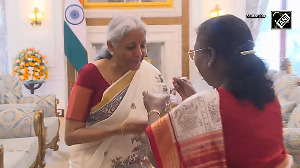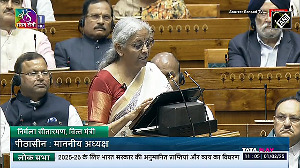Maintaining that the state had no compelling reasons to justify the violation of fundamental right of freedom of expression, the Madras High Court on Friday allowed the screening of controversial film The Da Vinci Code in Tamil Nadu and quashed a government order suspending its release.
Allowing the petition by the distributors of the film Sony Pictures and Anuroshini Films, Justice Prabha Sridevan also directed the Commissioner of Police, Chennai, to pay them Rs 1000 as litigation costs. The cost of litigation was revised to Rs 1000 from an earlier ordered sum of Rs 15,000.
"If this court was to tie its hands only because the impugned order states that local authorities exercised their power under section 13(1) of the Cinematography Act, then it will give wide powers for the state to sit over a decision taken by an expert body, which granted certificate in accordance with the provisions of the Act," the judge said.
She said the film had made it clear that it was a work of fiction and respected leaders of Christian community had not expressed apprehensions that the film was likely to result in 'breach of peace.'
Noting that the petitioners had met Tamil Nadu chief minister and offered to show the film to authorities and leaders of Christian community if need be, the judge said these facts were not considered.
It would be dangerous to suspend the screening of the film, if petulant groups of self-appointed persons demanded so even after it had the approval of the Censor Board of Film Certification, she said.
"By no stretch of imagination can we say that the effect of the film was intrinsically dangerous to public interest," the judge said.
Noting the government's contention that there could be breach of peace if the film was exhibited, the judge said the inability of the state to maintain law and order or avert a breach of peace could not be a ground for suspending the screening of the film.
The state had a duty to prevent demonstrations and processions, which amounted to intimidating the rights of the petitioners for freedom of expression and not to please some persons, who threaten breach of peace, she said.
Such threats to freedom of artistic expression were on the rise all over the country, she said, adding that this was not a healthy trend and should be nipped in the bud. The persons who were objecting to the film were not forcibly exposed to the film and they were free to avoid seeing it, she noted.
The stand of the government that it was not open for the petitioners to approach the court till the Centre had taken a stand on the impugned order was surprising, she said, adding that it was not necessary for the petitioners as their fundamental right had already been infringed.






 © 2025
© 2025